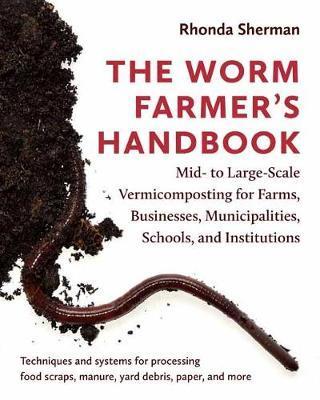Worm Farmer's Handbook

Worm Farmer's Handbook
Turning waste into wealth sounds too good to be true, but many worm farmers are finding that vermicomposting is a reliable way to do just that. Vermicast--a biologically active, nutrient-rich mix of earthworm castings and decomposed organic matter--sells for $400 or more per cubic yard. Compare that to regular compost, sold at about $30 a cubic yard, and you'll see why vermicomposting has taken root in most countries and on every continent but Antarctica.
Vermicomposting is also one of the best sustainable solutions for organic waste management. Vermicomposting manure and crop wastes on farms improves crop yields while reducing demand for off-farm inputs. Vermicast has higher nutrient levels and lower soluble salt content than regular compost, and it improves soil aeration, porosity, and water retention. Plus, vermicast suppresses plant diseases and insect attacks. Municipalities, businesses, community gardens, schools, and universities can set up vermicomposting operations to process food residuals and other waste materials.
The Worm Farmer's Handbook details the ins and outs of vermicomposting for mid- to large-scale operations, including how to recycle organic materials ranging from food wastes and yard trimmings to manure and shredded office paper. Vermicomposting expert Rhonda Sherman shares what she has learned over twenty-five years working with commercial worm growers and researchers around the world. Her profiles of successful worm growers across the United States and from New Zealand to the Middle East and Europe describe their proven methods and systems.
This book digs into all the details, including:
Choosing the right production system
Regulatory issues and developing a business and marketing plan
Finding and managing feedstocks
PRP: 185.69 Lei
Acesta este Prețul Recomandat de Producător. Prețul de vânzare al produsului este afișat mai jos.
167.12Lei
167.12Lei
185.69 LeiLivrare in 2-4 saptamani
Descrierea produsului
Turning waste into wealth sounds too good to be true, but many worm farmers are finding that vermicomposting is a reliable way to do just that. Vermicast--a biologically active, nutrient-rich mix of earthworm castings and decomposed organic matter--sells for $400 or more per cubic yard. Compare that to regular compost, sold at about $30 a cubic yard, and you'll see why vermicomposting has taken root in most countries and on every continent but Antarctica.
Vermicomposting is also one of the best sustainable solutions for organic waste management. Vermicomposting manure and crop wastes on farms improves crop yields while reducing demand for off-farm inputs. Vermicast has higher nutrient levels and lower soluble salt content than regular compost, and it improves soil aeration, porosity, and water retention. Plus, vermicast suppresses plant diseases and insect attacks. Municipalities, businesses, community gardens, schools, and universities can set up vermicomposting operations to process food residuals and other waste materials.
The Worm Farmer's Handbook details the ins and outs of vermicomposting for mid- to large-scale operations, including how to recycle organic materials ranging from food wastes and yard trimmings to manure and shredded office paper. Vermicomposting expert Rhonda Sherman shares what she has learned over twenty-five years working with commercial worm growers and researchers around the world. Her profiles of successful worm growers across the United States and from New Zealand to the Middle East and Europe describe their proven methods and systems.
This book digs into all the details, including:
Choosing the right production system
Regulatory issues and developing a business and marketing plan
Finding and managing feedstocks
S-ar putea să-ți placă și
De același autor
Istoricul tău de navigare
Acum se comandă
Noi suntem despre cărți, și la fel este și
Newsletter-ul nostru.
Abonează-te la veștile literare și primești un cupon de -10% pentru viitoarea ta comandă!
*Reducerea aplicată prin cupon nu se cumulează, ci se aplică reducerea cea mai mare.


Salut! Te pot ajuta?
X









